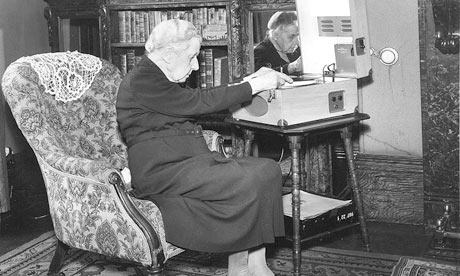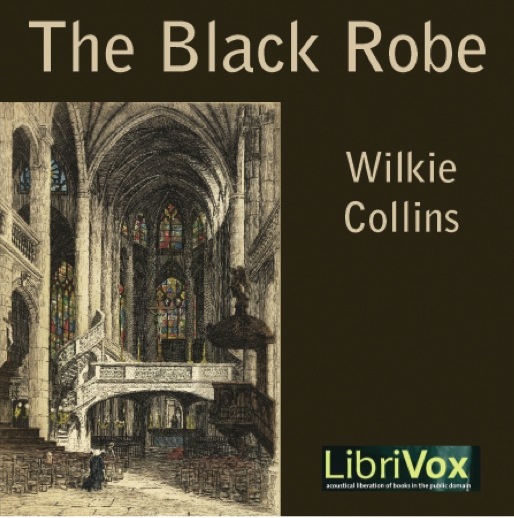An early audio book listener.
Because nothing says socialism like audio books for the blind! RNIB, a British support organization for blind and partially sighted people and it’s American counterpart, AFB, are celebrating the 75th anniversary of the “Talking Book”.
Soldiers of the First World War, blinded in battle  – often suffering additional disabilities like the loss of limbs – understandably found learning and reading braille difficult and were the first to urge the investigation into another method, spurring the RNIB to come up with its Talking Book service. American soldiers similarly blinded in the War were supplied brailled literature by the socialist organization, Library of Congress and distributed by Evergreen, a Red Cross Institute for the Blind in Baltimore, in 1920. Can you imagine the government today giving a crap about our veterans struggles with adapting to their injuries? Or reading?
An article in The Times in 1936 quotes a blind ex-soldier’s reaction to Talking Books:
“The person who thought of the Talking Book ought to have a monument three times the size of Nelson’s… This is how I enjoy my Talking Book. Every night about 10 o’clock…I make the fire up, draw my armchair near…then I switch on the Talking Book. Don’t you think that is real luxury? …Not being able to sleep much and being very poor at braille you can imagine how useful the Talking Book is to me.”
Soldiers blinded in World War I reading brailled literature supplied by the Library of Congress in 1920.
The first book to be sent out was the twisty Hercule Poirot classic, The Murder of Roger Ackroyd by Agatha Christie (what better mystery story for a Talking Book, as one in which the narrator himself turns out to be the murderer?). The books were recorded on 12-inch shellac gramophone records and each side lasted 25 minutes. Even though the records played at 24 revolutions per minute – rather than the then standard 75 rpm so that 25 minutes of speech could be crammed on each side – a typical book would need ten double sided records.
In the UK, The Society of Authors and the Society of Publishers lent RNIB their support to avoid copyright problems and the socialist Post Office granted cheap postage rates. By September 1937, 966 specialized 24 rpm players had been sent out to readers with 42 new titles recorded. Since then, some 75m books on vinyl, cassette and now special compressed CD, have been issued free to more than 2 million people with sight problems. The most popular authors are JK Rowling, James Patterson, Agatha Christie, Danielle Steel and John Grisham. Over the past year, the most popular titles were Wolf Hall, and  something called How to Cheat at Cooking. Even with the RNIB working with publishers to widen the range of titles available, only 5% of books are available with added audio instructions and information for the sight impaired. And very few publishers offer the charity audio files in advance so it can convert them to talking book format. A notable exception is the Harry Potter series, read by the actor Jim Dale, which it can release as talking books simultaneously.
There are approximately 18,000 titles available, each costing up to a whopping $3,000 to produce. The RNIB charity charges an annual $100 subscription fee, which includes the special player required to listen to the extra-long CDs. Often, the fee is covered by socialist local governments via socialist library services. ‘That All May Read’ is a free national library program in the US that offers both braille and recorded materials for blind and physically handicapped persons. It is administered by the socialist National Library Service for the Blind and Physically Handicapped, Library of Congress.
 Ossie Davis (1917 -2005) narrating in the recording studios of the American Foundation for the Blind.
Ossie Davis (1917 -2005) narrating in the recording studios of the American Foundation for the Blind.
Some audiobooks are read by professional actors, who do all the voices, so the experience in really a performance. Obviously these vary quality and offensiveness. A well delivered performance can add drama to the experience, often with the vivid intensity of a play or a movie. But when they are bad they are ruinous. Often the best are voiced by a bland-voiced reader who simply presents the material, enunciating the words in a straight forward manner so that the experience is the text alone. The accent or tonal qualities of the voice becomes immaterial, and the voice of the writer takes over. Some things, poetry and prose, Shakespeare, etc. could probably actually be enhanced by a good, lordly actor, like Captain Picard for instance.
There are several services that offer downloadable audio books – all in the public domain to protect infringement – all read by volunteers. Two great ones are:
In French:http://www.litteratureaudio.com/
In English: Librivox is the best place to go: http://librivox.org/. I downloaded Wilke Collin’s The Black Robe from Librivox, exquisitely read by a gentleman in a lyrical (Swedish?)  idiom named Lars Rolander. It is fantastic.




